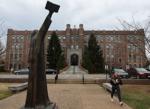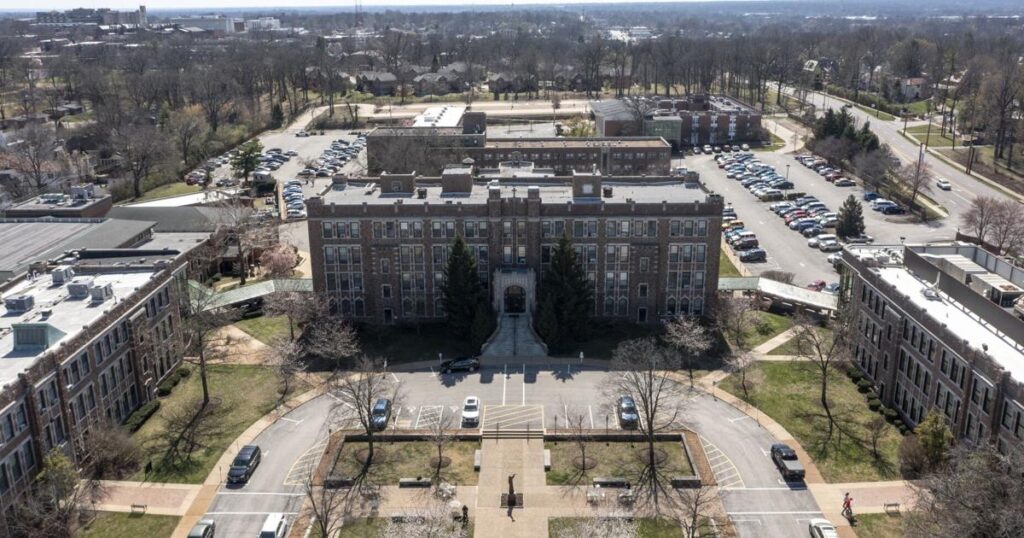CLAYTON — Fontbonne University students had just returned from spring break Monday when they received a text message at 11:09 a.m.: “President Blattner will hold an all-student meeting at 11:30 a.m. today to share important news,” the message read. “Please attend if able.”
About 100 out of 874 students turned out. The university’s leader, Nancy Blattner, read from prepared notes: The 101-year-old institution would close after the summer 2025 term. She did not take any questions.
Several students began crying; others abruptly left. The mood was somber. Anger began to bubble.
“It felt very heavy,” said graduate student Abby Platte.
The announcement came less than four months after officials said they had a plan to ensure the longevity of the Clayton-based university.
People are also reading…
But it’s unclear whether the plan — eliminating 21 degree programs and 19 faculty positions — was given a chance to work: Just weeks after publicizing the cuts in November, Fontbonne quietly began negotiations to sell its campus to Washington University.
Blattner told reporters Monday that she never thought she would have to shut down a university. She felt heartbroken, she said, to deliver the news to students that included two of her grandchildren.
“Your dream of graduating from Fontbonne may not be realized,” she told students, “but your dream of graduating from college can be.”
It was a shocking end, but one that came after years of declining enrollment and budget deficits. And its demise comes as colleges across the country are facing more competition for fewer students that has widened the gulf between small, liberal arts colleges and major research universities.
Merger talks failed
The end of Fontbonne closes a chapter in local feminist history. The Sisters of St. Joseph of Carondelet founded the college in 1923 to open higher education to more women after World War I. The college’s primary fields of study were dominated by women — education, fine arts, dietetics, speech and communication. And although the college became co-ed in the 1970s, only two of Fontbonne’s 15 presidents were men.
https://www.newspapers.com/article/st-louis-post-dispatch/143428965/
Article from Jun 18, 1923 St. Louis Post-Dispatch (St. Louis, Missouri)
Fontbonne experienced its best years from 1980 to 2010, when enrollment grew to a peak of 3,000. The athletics program was upgraded to NCAA Division III and many academic programs were added. The university attracted international students and working professionals seeking advanced degrees through weekend and night classes.
The university’s downfall followed several missteps, like buying the shuttered John F. Kennedy High School in west St. Louis County in 2018 only to sell it without ever breaking ground. Blattner’s plan to boost enrollment with a sprint football program in 2022 failed when half the team dropped out after its inaugural season.
Other factors out of Fontbonne’s control include a longstanding decline in birth rates and a growing distrust in the value of higher education.
Blattner told reporters that she knew there would be “significant financial challenges” when she returned to the university in July 2020 after serving as vice president from 2004 to 2009. The university had been losing students for a decade, and was increasingly dependent on tuition because of declining endowment funds, which now stand at $9 million.
Still, Blattner said Nov. 30 that the “final retrenchment plan” of more than $2 million in budget cuts would insure Fontbonne’s long-term sustainability. But by late December, talks had started on a real estate deal with Washington U., Blattner told reporters Monday. At least six Fontbonne officials resigned prior to the closure announcement, including the heads of human resources, finance, marketing and registration.
When asked what caused the sudden about-face, Blattner cited two primary factors: Fontbonne leaders failed to negotiate a merger or acquisition with “many” other colleges. And the Higher Learning Commission, the main accrediting body for universities, told Fontbonne to submit a viability plan for every degree program it offered, Blattner said.
That mandate, Blattner said, meant Fontbonne couldn’t admit new students, leaving it with no choice but to close.
A spokeswoman for the commission said universities are asked to submit a plan for programs they expect to close in order to provide students with options for completing their studies.
“The institution determines what programs it is closing or discontinuing. HLC has no role in making that determination,” the spokeswoman, Laura Janota, said in an email.
Blattner informed the HLC on March 8 that the university would close. Fontbonne’s board of trustees voted two days later to shut down. At some point that weekend, Fontbonne and Washington U. agreed to the sale.
No surprise to students
Several students told the Post-Dispatch they were not surprised by the university’s upcoming closure. Deferred maintenance in various dormitories and academic buildings had piled up over the years. And since the fall 2023 semester, they felt that staff and faculty seemed to put in less effort. They described what felt like a “mass exodus” of administrators and professors beginning in January.
Kaylee Gordon sensed things weren’t going well as soon as she arrived last fall as a freshman from Dexter, Missouri. The elevator and HVAC system in her dorm regularly broke down. Students were fined $100 for propping their doors open, she said. Her adviser quit after telling students to transfer to other schools.
“It’s time to move on and forget this whole year ever happened,” said Gordon, 19, who will transfer to the University of Missouri-Columbia next fall.
Graduate student M.V. Laughlin also had an inkling that the university might close. The university announced in November that the fine arts department was one of 21 programs the school was going to cut. She launched an effort to save her department by fundraising. But she said administrators “resisted” her efforts. She felt a glimmer of hope that officials could change their minds when a representative of the Sisters of St. Joseph told her there may be good news in February. Ultimately, no such news was delivered.
Undergraduate Alina Dunder was in the process of applying for a master’s degree in fine arts education and only needs two more courses to earn a teaching certificate.
“It’s very frustrating for me, having almost submitted my application and then having this decision being made seemingly last minute,” Dunder said. “No real notice, no real plan. It doesn’t seem like there was any (effort) to save the university.”
‘A dignified conclusion’
Arguably the most distinguished program at Fontbonne was deaf education. The school received more than $8 million in federal grants over the years to increase the number of teachers and speech pathologists who serve children with hearing loss. The program’s graduates were actively recruited to jobs across the country.
Last year, there were 60 graduates with a bachelor’s or master’s degree in speech-language pathology, Fontbonne’s largest major. Another 34 graduated with degrees in special education.
“In the day when it is getting difficult to find teachers, I worry about not having Fontbonne in the St. Louis area,” said Anne Burgio, a deaf education major who graduated from Fontbonne in 1997 and now works in the Lindbergh School District. “When I heard a teacher went to Fontbonne, I knew we were getting a quality trained teacher. It was truly a special place.”
Losing a school that prepares teachers to work with children who are deaf “is obviously not ideal because there are so few programs and especially programs that train specifically in listening and spoken language development,” said Amy Knackstedt, director of the Joanne Parrish Knight Family Center at the Central Institute for the Deaf in St. Louis.
Knackstedt, who has bachelor’s and master’s degrees from Fontbonne, added that while the closure is disappointing, St. Louis is fortunate that Washington U.’s deaf education department remains strong.
Blattner, the Fontbonne president, said she wants “to help as many people as possible to a dignified conclusion” of their time at the university. The remaining endowment will be used for scholarships. Courses in the summer terms of 2024 and 2025 will be tuition-free, along with any courses above a full load in the final academic year.
A prayer service in Doerr Chapel on campus Wednesday felt like a family funeral. About 25 of the Sisters of St. Joseph raised their hands and sang “Sancte Joseph” in Latin to close the service.
“We were celebrating the difference that Fontbonne has made and will continue to make forever,” said Joan Falk, who graduated in fine arts in the 1960s. “The ripples that go out from the work they’ve done will never stop.”
Michelle Torigian, who graduated in 1995, said Fontbonne influenced her faith journey to becoming a pastor at St. Paul United Church of Christ in Belleville.
“Being a person of faith, you understand the depths of what renewal and resurrection are about, and even with endings there are beginnings,” Torigian said. “But first there is a time to grieve, and that’s what this time is.”






Nancy Blattner, president of Fontbonne University, answers pre-submitted questions in Ryan Hall Chapel on Monday, March 11, 2024, after reading a statement to media about the coming closure of the 100-year-old institution. Video by Christian Gooden, Post-Dispatch

Nancy Blattner, president of Fontbonne University, pauses while addressing the media in Ryan Hall Chapel on Monday, March 11, 2024, after announcing the coming closure of the more than 100-year-old institution.

A student walks in front of Ryan Hall on Thursday, Nov. 30, 2023, at Fontbonne University in Clayton.

Students in gowns line up waiting to get capped at a freshmen induction ceremony on the steps of Ryan Hall at Fontbonne College, now known as Fontbonne University, 1962. (Fontbonne archives)


